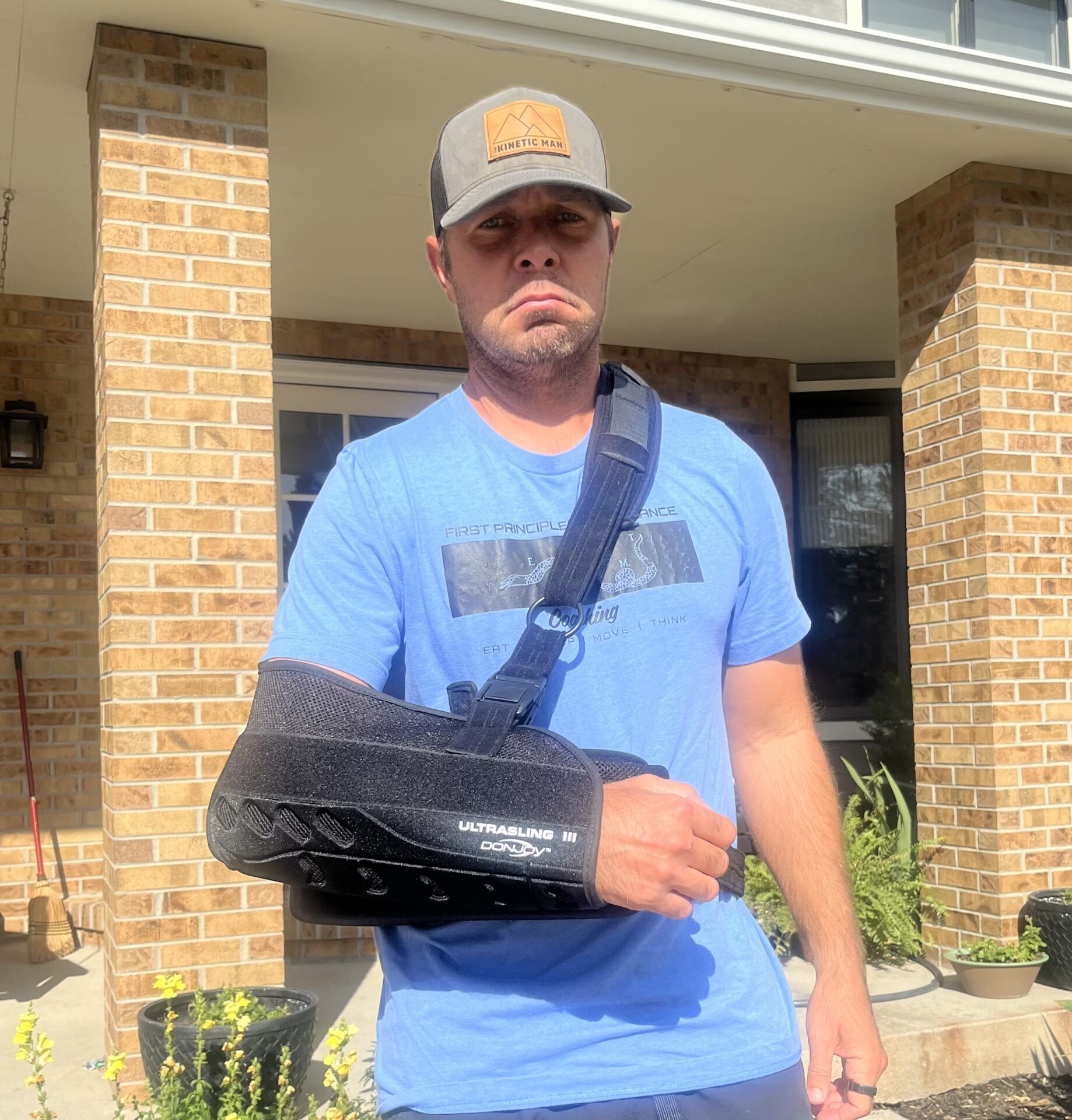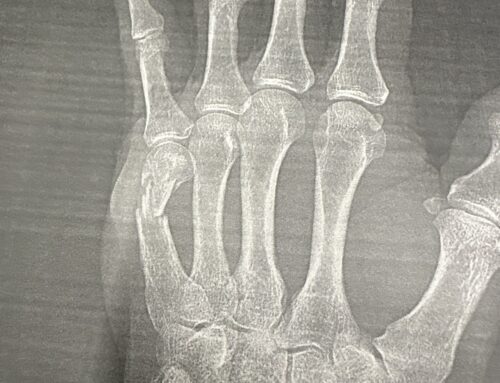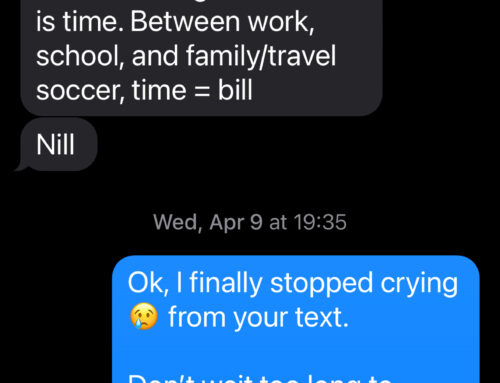
TN50#170_Busted Up – Now what? _15 July_2024
Hi Team,
I’m having lunch with my buddy Stu G. at CAVA (think Chipotle but Mediterranean) on Thursday last week. Stu’s telling me how he’s going mountain biking with Dave G. before our Kinetic Man call the next day. Fast forward 24 hours, as our video call fires up the next day, no Stu, just David. Once David unmuted his mic, I found out that Stu went from “adventure ready” mountain biker to “over the handlebars” mountain biker to “currently at the emergency room” mountain biker.
Happy Monday and welcome to The Next 50 #170. I like to think of personal performance in 3 components: physical, mental and emotional. My frameworks focus on 4 Buckets: Eat, Sleep, Move and Think. This blog is my sandbox for sharing information that you might find useful for your personal performance.
My man, Stu, broke his clavicle and a rib. As he texted in a narcotic haze on Friday, “no longer adventure ready” I disagreed. I’d say even in his current state he is more adventure ready than most of us. And as you can see in this picture from this morning, he’s already in good enough shape to throw on his FPP Coaching t shirt for our header photo. Here’s how he will get back to his new 100%:
- EAT – Maintain your protein base line as part of a high quality, whole food diet.
- If you’ve never hit that 1g of protein per lb. of body weight high bar for daily protein consumption, now’s the time to do it. This will help with your current state of repair and help reduce muscle loss at the site of injury and overall, in the body.
- Take high dose, high quality Omega 3 (3g or so daily of DHA/EPA): We all need a lot of Omega 3 in our diet through whole foods and/or supplementation on a good day. For injury recovery it’s even more important. It makes sense that O3’s ability to help reduce inflammation across all the systems of the body is even more important during a time of injury recovery, but there may be more to it. There’s some good science coming out regarding high dose Omega 3, regarding it’s ability to potentially reduce the amount of muscle loss in the injured/immobilized areas of the body. Here’s a short clip on this with Dr. Rhonda Patrick and Dr. Chris McGlory.
- Stay hydrated! I don’t know many people who drink enough water on a regular day, focus on hydration when you are injured.
- This Outside magazine article is a great supplemental resource for a deeper dive on eating during injury.
- SLEEP – In addition to rest after injury, sleep is when the body does a lot of healing, you want to pull out all the stops on insuring you are giving yourself the best opportunity for sleep, this includes all the basics.
- Environment: in addition to the basics figuring out how to get in a good position that allows sleep is really important, this may be a time to self-banish to the spare bedroom.
- Rituals: you already have great pre bed rituals, right? Make sure you are knocking those out of the park and if you’ve never used sleep meditations (like a 30-minute body scan) now would be a good time to give those a try. This is also a great time to brush off some of those breath work exercises for down regulating your nervous system that you learned a few years ago.
- MOVE – Move what you can as much as you can, while protecting the injury.
- Recently injured is not the time to completely veg out on the couch, unless you have absolutely no choice. Remember when it comes to movement, everything counts so do what you can do as soon as you can do it.
- Can you walk with an upper body injury? Absolutely you can. Lower body injury? You might need to wait a bit but with most lower body injuries you can get moving pretty quickly, don’t hesitate to use those crutches or even the one-legged scooters. Walking with crutches has to be a pretty good upper body work out as I’ve read that you use 20% more calories moving around with crutches compared to regular walking.
- What about working out? Injured on the right side? Work what you can on the left side. Lower body injury? Work the upper body. Upper body injury? You get the picture. The naturally occurring internal responses to a workout are very beneficial to the injured area(s) of the body. So get creative and get after it.
- Maintaining flexibility and range of motion is also very important as you recover. This might be a great time to spend some of your freed up training time getting better in other areas of your fitness, like mobility.
- Sauna: I’m throwing sauna in here with MOVE because a 20-minute sauna ride is similar to a Z2 cardio workout in a lot of cases and all you have to do is sit there! Additionally, sauna is known to promote blood circulation, detoxification and reduce inflammation so this is a no brainer. And here’s a little bonus: sauna has anti-catabolic effects in muscle; in sixth grade English this means regular sauna use after an injury will help you maintain muscle in the injured area as well as your body in general. Check out this short clip on the subject with Dr. Rhonda Patrick and Dr. Stuart Phillips.
- THINK – “What you believe can make it so.” Quote from the inside jacket of the book, The Expectation Effect, by David Robson, one of the best books I read in 2023. Our minds are very powerful so if you think “this injury is going to ruin my life”, you are upping the chances that “this injury” is going to ruin your life. Of course, that means the opposite is also true so keep a “this is temporary” mindset and stay curious with your thoughts. Here again I’d stick with the basics on thought work and if you haven’t read the book I just quoted, now would be a great time to do that.
- Here’s the number 1 thing: DO NOT START DOING DUMB STUFF: A lot of people dive headfirst into bad behavior after getting injured right when their body, brain and mind need better behavior. Don’t be that guy or gal. Here’s 3 start points to focus on:
- Recognize Useless Thoughts (RUTs): resistance, distraction and victimhood are hard enough to keep at bay on a healthy day, keep an eye out for these mind-devils and when they come a knocking tell them, “Not today Satan, not today”. One of my favorite things to do during or after I have a “moment” (read: solo, breath holding, foot stopping temper tantrum) is to have a little laugh at myself (this ability can be life saving and I mean it).
- Neutral Mindset: No matter how much you wish, XYZ hadn’t happened, you can’t take it back. So now’s the time to focus on what you can have an effect on – the present and the future. It’s much easier to do the next best thing in the present when you aren’t catastrophizing about the past. Take this opportunity to become an expert on your body, start with learning everything you can about your injured area and visualize the healing process based on what you learn about physiology and anatomy.
- Relationships: You are who you surround yourself with. Stay in touch with your friends and family, including the jerk who took you on that adventure and got you hurt (kidding here -unless they really is a jerk!). This is not the time to become soul mates with the original 5 casts of MTV’s The Real World, The Simpsons, 2 ½ Men, etc… Stay connected with your “best-self” tribe.
Wow, in some ways I feel like I’m just getting started and I’m already a few hundred words past my normal article, so I’ll stop here for now.
Please let me know where you need a little or a lot more information (alex@fpp.llc) and where you think I’m wrong – I learn a lot from those responses!
Who do you know that could use this information? I bet you can think of a couple folks before you click the next email, please share the post with your team and anyone who might find it useful and let me know what you think!
Have a good one,
Alex
PS. I am not a doctor and I offer all this information for you to consider and discuss with your healthcare team.
PPS. please take responsibility for your own Questions on your personal performance? Let me know at: alex@fpp.llc
PPPS. If you’re new to First Principles Performance Coaching, here’s a one stop shop for my stuff.
PPPPS. Ready to improve your Executive and Human Performance, email me so I can introduce you to my first ever Better Basics Program – Team Coaching opportunity! alex@fpp.llc



